How creative engineering research is for effective solutions to planetary crises Dr. Ye Tao, Rowland Institute, Harvard University
- Date(s)
- October 19, 2021
- Location
- Queen's University Belfast - Canada Room and Council Chamber
- Time
- 13:30 - 15:00
There are several advantages to using mirrors, which could potentially provide further benefits:
- Mirrors last for decades (paint lasts 5yrs)
- Higher reflectivity (1 compared with 0.7 for paint)
- Higher climate mitigation (3 tonnes CO2 offset per roof)
For more information see MEER Reflection Website
About this event
Creative engineering and pan-disciplinary research are essential parts of an effective response to a cascade of ecological, environmental, and socioeconomic crises that have begun to wreak havoc on human societies worldwide. This talk serves as an introduction to the critical contribution that creative engineering and pan-disciplinary research can make to an effective response.
The talk begins with two surveys of the scientific literature on two related topics: 1) the effect of warming on key terrestrial ecosystems and 2) how the positive energy imbalance—which has been created by an ongoing reduction in outbound longwave radiation—is causing Earth’s climate system to change in graduated and accelerating steps. A synthesis of the conclusions that are derived from this literature indicates that managing the fast-approaching climate catastrophe is no longer possible through the pursuit of frugality and simplicity, of clean energy policymaking, or the simultaneous pursuit of both. We emphasize the mismatch in orders of magnitude between the heating power that drives the energy imbalance and the entire fossil fuel-based technical power available to humans for addressing the problem either by building new renewable energy infrastructure, by building and operating complex systems for the direct air capture of carbon dioxide, or by a combination of both approaches. This quantitative gap between these two power sources is the fundamental reason that existing greenhouse gas mitigation paradigms can have no measurable positive effect on the near-term decadal trajectory of Earth’s climate system.
The immense imbalance of solar radiation within the climate system and the kinetics of the deterioration of ecosystems guarantee the inadequacy of all conventional mitigation proposals. The fossil-fuel power that is available for restoring equilibrium is woefully inadequate. The accelerating rates at which ecosystems continue to deteriorate render the amount of time that conventional proposals require as grossly insufficient. A global response that is based on a miscalculation of this scale would assure the extinction status of Homo Sapiens. We propose, therefore, a return to first principles for reanalyzing the problem in a way that simplifies it and prioritizes exploiting the most abundant and easily harvested form of renewable energy (i.e., solar thermal energy). Within the framework, a triage-like process—one in which the various threats to Earth’s ecosystems are assessed and dealt with in their order of urgency—is applied to the various projects.
We look forward to a robust post-presentation conversation on the range of contributions that artists, engineers, social scientists, other research and science professionals, and concerned ordinary citizens are making in this perilous—and yet highly exciting—moment in human history. We hope to extend the scope of that conversation to include also the roles that academic and civil institutions, both emergent and traditional, could play.
